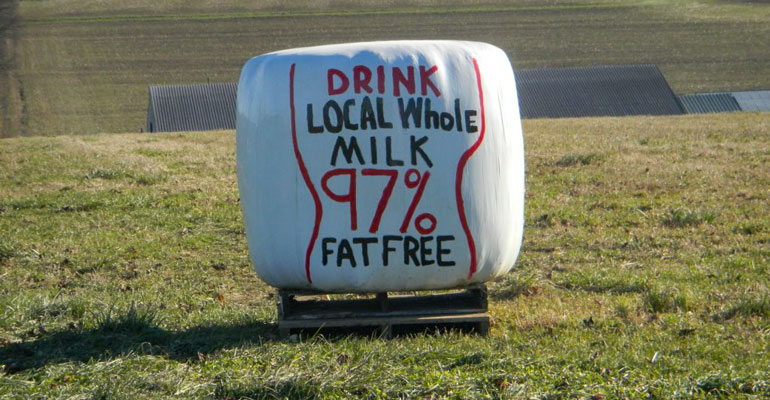
Nelson Troutman doesn’t like to use the word awesome. But he can’t help himself these days.
“This is awesome,” was what he said the other day when I called him at his Womelsdorf, Pa., farm to check in on how his “Drink 97%” campaign was going.
In case you haven’t seen them yet, Troutman is the farm brains behind the “Drink 97% whole milk” bales that have been popping up around the area.
Oh, you haven’t seen them yet? Let me give you a quick rundown.
Troutman, who farms less than 5 miles from my house, got an idea this past fall to promote locally produced, whole milk. He and a group of farmers initially wanted to advertise on a billboard, but they found that $95 a day was too steep. So, he thought of something a little simpler.
“I thought, ‘I could paint a message on a bale,’” he said.
He painted a simple message — “Drink locally sourced, 97% fat-free milk” — using just some paint and a little bit of creativity.
The first bale he placed at a four-way intersection just outside his farm. Soon after, people started calling him, asking how to get their own bales. News reporters started calling, too, wanting to get the story on these strange bales popping up on farms.
Troutman even got some help from R&J Dairy Consulting in Lancaster, Pa., to help spread the word about 97% milk. The business helped him get a website started, 97milk.com, and a Facebook site that’s updated daily with posts about whole milk and the local farmers that produce it. It has nearly 3,000 “likes.”
Since then, many other farmers have joined the 97% movement, making bales of their own or getting Troutman to make them. Troutman estimates that he’s spent $1,000 of his own money on the bales, paint and other materials.
The whole idea — pardon the pun — of 97% milk has gained steam. Many farmers have complained that the Obama administration’s school nutrition standards, which included taking flavored low-fat milk out of school cafeterias, has led to lower consumption.
Couple that with the growth of plant-based “milk” and other factors, and it’s been a tough go for fluid milk. The latest Economic Research Service data, updated last fall, shows that 2017 per-capita milk consumption was 149 pounds per person, a new low. Total fluid milk sales, released last August, dropped for the seventh-straight year in 2017, even though whole milk sales increased in 2017, the fourth-straight year of increases.
For its part, the government has relaxed rules on low-fat flavored milk, giving schools the option to offer it in their cafeterias if they so choose. At least one bill has been introduced in Congress to get whole milk back in schools.
And now, farmers like Troutman are taking milk promotion, and whole milk promotion, into their own hands. More power to them. We in the farming community are inundated with so much negativity, especially around dairy, that it’s nice to see a farmer finally stand up for something. And, he’s doing it in a positive way.
A positive story is something we can all toast a glass of milk to.
About the Author(s)
You May Also Like






